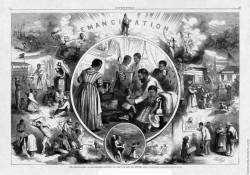Why are black-eyed peas thought to bring New Year’s luck?
 January 1, 1863 — The belief that black-eyed peas are a lucky New Year’s meal has long been popular in the south, explains Southern Traditions reporter Amanda Galiano.
January 1, 1863 — The belief that black-eyed peas are a lucky New Year’s meal has long been popular in the south, explains Southern Traditions reporter Amanda Galiano.
“Many Southerners will tell you that this tradition has its roots in the Civil War, back when black-eyed peas were considered feed for animal food,” Galiano shares. “But when Union soldiers raided the Confederates food supplies, they are said to have grabbed everything except the black-eyed peas and salted pork. The Confederates considered themselves lucky to be left with those meager supplies for it helped them to survive the winter — making those peas a symbol of luck.”
“[Another] explanation of the superstition says that black-eyed peas were all the southern slaves had to celebrate with on the first day of January, 1863. What were they celebrating? That was the day when the Emancipation Proclamation went into effect. From then on, peas were always eaten on the first day of January.”
But perhaps the tradition is even older. During the time of the Pharaohs, it was believed that eating a meager meal like black-eyed peas showed humility before the gods, and you would be blessed. And, the Babylonian Talmud, which dates to 339 CE, instructs the faithful Jews to eat black-eyed peas at Rosh Hashana. It was believed that those who ate black-eyes showed their humility and saved themselves from the wrath of God.
Sources: littlerock.about.com, wikipedia, thomasnastcartoons
Words of Wisdom
We lived very simply — but with all the essentials of life well understood and provided for - hot baths, cold champagne, new peas and old brandy.
In the course of my life. I have often had to eat my words, and I must confess that I have always found it a wholesome diet.





